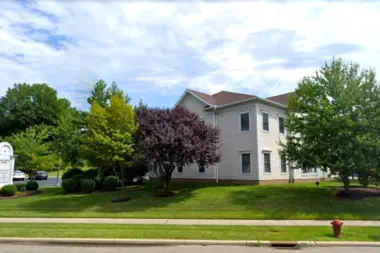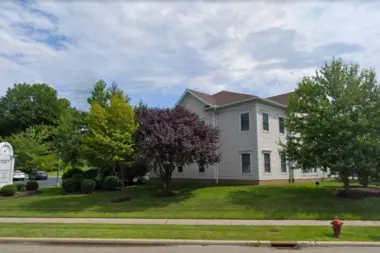About National Youth Advocate Program – Tallmadge
The National Youth Advocate Program is a mental health and substance use treatment facility in Tallmadge, Ohio. They offer outpatient treatment services and telehealth options for added convenience. Smoking is permitted in designated areas, and they provide inclusive services for the deaf and hard of hearing.
Programs That Support Life Transitions
They work with people across different age groups, from kids and teens to adults and seniors. Services are tailored to meet the unique needs of transition-age young adults who may be navigating major life changes, as well as those who have experienced trauma, clients with PTSD, and LGBTQ+ clients.
Therapeutic Foster Care for Higher Needs
They use traditional therapies to support recovery, including behavior modification, cognitive (CBT) and dialectical behavior therapy (DBT), individual and group therapy and trauma focused care. They also offer family and couples therapy, court-ordered outpatient treatment, case management and family education.
Therapeutic foster care is helpful for those with more significant needs who require a higher level of support than traditional foster care.
Payment Options That Make Care Accessible
They accept a wide range of payment options to make care more accessible. This includes Medicare, Medicaid and most private insurance plans. You can also pay out of pocket, and there’s support available through state and local funding sources.
Nearby Parks for Rest and Reflection
Tallmadge is a suburb of Akron with nearby parks and landmarks that can support your journey while receiving treatment. Tallmadge Circle Park is a four and a half acre space in the heart of the city that is surrounded by landmarks like the Old Town Hall and Tallmadge Church.
Nearby Munroe Falls Metro Park has beautiful open fields, forests and a lakeside area where you can walk or relax. I like Cuyahoga Valley National Park for its Towpath Trail that follows the old Ohio and Erie Canal.
Rehab Score
Gallery




Other Forms of Payment
Medicaid is a state based program that helps lower-income individuals and families pay for healthcare. Medicaid covers addiction treatment so those enrolled can use their coverage to pay for rehab. When a program accepts Medicaid the client often pays very little or nothing out of their own pocket.
Financial aid can take many forms. Centers may have grants or scholarships available to clients who meet eligibility requirements. Programs that receive SAMHSA grants may have financial aid available for those who need treatment as well. Grants and scholarships can help you pai for treatment without having to repay.
Self-pay involves paying for treatment out of your own pocket. You can use savings or credit, get a personal loan, or receive help from family and friends to fund your treatment. If you don't have insurance or your insurance plan doesn't cover a specific program, self-pay can help ensure you still get the care you need.
Private insurance refers to any kind of healthcare coverage that isn't from the state or federal government. This includes individual and family plans offered by an employer or purchased from the Insurance Marketplace. Every plan will have different requirements and out of pocket costs so be sure to get the full details before you start treatment.
Addiction Treatments
Levels of Care
Outpatient Programs (OP) are for those seeking mental rehab or drug rehab, but who also stay at home every night. The main difference between outpatient treatment (OP) and intensive outpatient treatment (IOP) lies in the amount of hours the patient spends at the facility. Most of the time an outpatient program is designed for someone who has completed an inpatient stay and is looking to continue their growth in recovery. Outpatient is not meant to be the starting point, it is commonly referred to as aftercare.
Treatments
Mental health rehabs focus on helping individuals recover from mental illnesses like bipolar disorder, clinical depression, anxiety disorders, schizophrenia, and more. Mental health professionals at these facilities are trained to understand and treat mental health issues, both in individual and group settings.
Substance rehabs focus on helping individuals recover from substance abuse, including alcohol and drug addiction (both illegal and prescription drugs). They often include the opportunity to engage in both individual as well as group therapy.
Programs
Adult rehab programs include therapies tailored to each client's specific needs, goals, and recovery progress. They are tailored to the specific challenges adult clients may face, including family and work pressures and commitments. From inpatient and residential treatment to various levels of outpatient services, there are many options available. Some facilities also help adults work through co-occurring conditions, like anxiety, that can accompany addiction.
Young adulthood can be an exciting, yet difficult, time of transition. Individuals in their late teens to mid-20s face unique stressors related to school, jobs, families, and social circles, which can lead to a rise in substance use. Rehab centers with dedicated young adult programs will include activities and amenities that cater to this age group, with an emphasis on specialized counseling, peer socialization, and ongoing aftercare.
Clinical Services
Group therapy is any therapeutic work that happens in a group (not one-on-one). There are a number of different group therapy modalities, including support groups, experiential therapy, psycho-education, and more. Group therapy involves treatment as well as processing interaction between group members.
In individual therapy, a patient meets one-on-one with a trained psychologist or counselor. Therapy is a pivotal part of effective substance abuse treatment, as it often covers root causes of addiction, including challenges faced by the patient in their social, family, and work/school life.
Staff
Marvena Twigg
President and CEO
Emily Lindley
Chief Program Excellence And Advancement Officer
Michelle Corry
Vice President For Organizational Excellence
Natalie Thomas
Vice President For People And Values Advancement
Reyahd D.j. Kazmi
Chief Advocacy & Government Strategies Officer
Contact Information
30 Northwest Ave
#120
Tallmadge, OH 44278